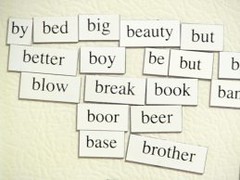
“The spirit of a language is most clearly expressed in its untranslatable words.”
― Baroness Marie ‘Freifrau’ von Ebner-Eschenbach
1. Choose a topic. (Bold Titles:)
2. Choose a source. ~ Example Source Title
3. Click on the title of the source. It is a link to the original website.
General Vocabulary Skills:
~ Word Reading Activities
~ English Guide – Simple English Vocabulary
~ Commonly Confused Word Pairs
~ Confusing Words and Homonyms
~ Homonyms Matching
~ Word Lists (The 20,000 most common word families in English) – from Paul Nation
~ Free Rice (answer English vocabulary questions) Bonus: your correct answers will donate rice to the World Food Program
~ Activities for ESL (vocabulary and grammar) – from the TESL organization
~ Live Worksheets (many topics – search for topics of interest)
~ Learning Chocolate (simple vocabulary exercises)
~ Bizmates (vocabulary videos)
~ Bonus: Wordle!
Note: See the Cultural Information page for Holidays and Symbols vocabulary games.
See the Games for Learning English page for games with vocabulary practice.
Popular Studying Sites:
~ Anki (make your own vocabulary lists or use someone else’s)
~ Memrise (make your own vocabulary lists or use someone else’s)
—–> Please contact Ms. Huntley for specific Memrise lists for English tests.
~ Quizlet (make your own flashcards or use someone else’s, play memory games)
~ Quizizz (play existing quizzes or make your own study materials)
~ Word Smyth (make your own vocabulary lists and self-tests)
~ Duolingo (language learning system)
Idioms:
~ The Idioms (Idioms Dictionary)
~ Common English Idioms
~ Idioms Worksheets
~ Idioms Review (Wordwall)
~ Idioms (Talk English)
~ Idioms (ESL Café)
Phrasal Verbs (also see Grammar exercises):
~ English Club (list and quiz)
~ British Council (quizzes and explanation)
~ FluentU (list of verbs with more than one phrasal expression)
~ Guide to Grammar (explains the different grammar patterns of phrasal verbs)
Current Slang:
~ ESL Café – General Slang
~ Urban Dictionary (not polite, but gives young people’s definitions for new slang)
~ Know Your Meme (for internet communication)
~ “Do Parents Know Teen Slang?” #1, #2, #3, #4, 2020 Edition
~ “Do Elders Know Modern Slang?” #1, #2, #3
~ ISMO – “The Word ASS” & “I Didn’t Know Sh*t” (Comedy, vocabulary usage)
~ American English Slang Dictionary (Word Document)
Note: Slang often becomes public on social media: Reddit, Imgur, YouTube, Instagram, et cetera. The best way to learn it is to follow young social media influencers.
SMS Language/Slang:
~ The Complete List of 1500+ Common Text Abbreviations & Acronyms
~ Texting Slang
~ Emojis (English Usage)
~ Emojipedia
Writers’ Advice on using advanced vocabulary:
“Don’t use words too big for the subject. Don’t say infinitely when you mean very; otherwise you’ll have no word left when you want to talk about something really infinite.”
– C.S. Lewis
“Don’t use a five-dollar word when a fifty-cent word will do.“
– Mark Twain
“Don’t use big words. They mean so little.“
– Oscar Wilde
“Polysyllables obfuscate a preponderant ignorance with so much more style and panache.”
– John Patrick Lowrie
A popular way to learn vocabulary is through word games. Here are a few classic options:
- Scrabble
- Apples to Apples
- Charades
- Pictionary
- Bananagrams
- Scattergories
